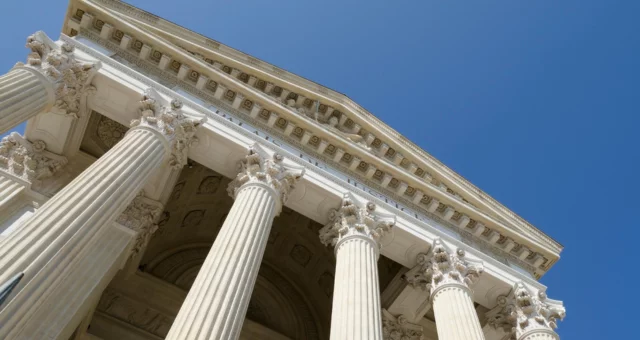Religious accommodations, Part 1: What’s a “religion”?
On September 25 a federal court in New York dismissed a lawsuit accusing an employer of failing to accommodate an employee’s religious beliefs as a member of the “Temple of the Healing Spirits” located in “Deland city, Florida Republic.”
I’m not making that up. The city was not capitalized, and it really said “Florida Republic.”
Two weeks later, a federal court in Pennsylvania refused to dismiss a lawsuit accusing an employer of failing to accommodate an employee’s religious belief, rooted in certain interpretations and translations of the King James Bible, requiring observance of the Lunar Sabbath.
As best as I can tell from the pleadings, the employee’s belief was not an established tenet of any specific religion.
These two cases present important questions for employers who may have to grapple with the Supreme Court’s Groff v. DeJoy decision reinvigorating the duty to accommodate religious beliefs: What is the meaning of religion? What level of sincerity is required for accommodation?
In this bulletin, we’ll explore “What is a religion?” Then we will follow up with another bulletin on the level of sincerity required for religious accommodation.
The meaning of religion – in a secular, non-spiritual way
As the late George Carlin saw it, religion has convinced people that there is an invisible man in the sky, who loves you and watches everything you do, and wants you to send him money. Lots of money. (I think his joke was aimed at some of God’s imperfect human representatives.) While ascribing to that view might be good for laughs, the cynicism it reflects is not good for legal compliance.
For purposes of Title VII, the U.S. Equal Employment Opportunity Commission has adopted the definition of religious belief established by the Supreme Court in United States v. Seeger. According to Seeger, a religious belief is one that occupies a place in a person’s life parallel to the place filled by God in traditional religions. Well, that’s about as clear as mud.
Religious beliefs include those practiced by well recognized faiths, like Christianity, Judaism, Islam, Seventh-Day Adventism, Hinduism, Sikhism, Buddhism, and a host of other “isms.” Religious beliefs also include those practiced by less traditional faiths, like Wicca (which I know), Bahai (which my first roommate at the University of Maryland practiced) and Kemetic (which Google told me is based on an ancient Egyptian faith).
But the imponderable biggies in the definition of religious beliefs are those which occupy a place in a person’s life parallel to the place filled by any of these mainstream and downstream religions. According to the EEOC Guidance on the subject, that can include theistic and non-theistic beliefs that are “new, uncommon, not part of a formal church or sect, only subscribed to by a small number of people or that seem illogical or unreasonable to others.” Holy cow! What’s an employer to do?
No second guessing
The Supreme Court has instructed lower courts to avoid becoming embroiled in deciding whether religious beliefs are reasonable, acceptable, logical, consistent, or comprehensible. Rather, a belief is “religious” if it is religious in an individual’s own scheme of things, and courts must avoid determining the plausibility of those beliefs.
Consistent with that admonition, judges are reluctant to second guess whether an employee’s belief or practice is “religious” in his or her scheme of things. As a result, an employee’s beliefs or practices can be protected even if other members of the faith do not ascribe to them. What matters is that the employee believes them to be religious in nature.
To be fair, it should be noted that personal preferences and social, political, moral, or economic philosophies are not religious beliefs entitled to protection or accommodation under Title VII. But if an employer denies a requested accommodation because it second guesses the existence or reasonableness of the religious belief, it will have an uphill battle convincing a judge to do the same.
Back to the beginning
In Johnson v York Academy, Monik Johnson worked as Business Manager at the Academy from 2011 to 2019. During the school year, she worked eight hours per day, Monday through Friday. During the summer she worked 10 hours per day, Monday through Thursday.
In November 2017, Ms. Johnson began to practice religious beliefs that follow a Lunar Sabbath. Her lawsuit alleged these to be sincerely held beliefs, rooted in the King James Bible, which she said commanded her to keep the Lunar Sabbath holy.
Ms. Johnson requested an accommodation allowing her to be off on the Lunar Sabbath. She supported her request with a statement from a third party attesting to the need for the accommodation, a calendar identifying the dates when Ms. Johnson would need to be off, and a letter stating that she would work on Fridays during the summer if the Lunar Sabbath fell on a weekend and that she could be contacted on the Lunar Sabbath in the event of an emergency.
While her accommodation request was being processed, Ms. Johnson began experiencing stress from having to work on the Sabbath and took a leave of absence. While on leave, Ms. Johnson’s requested accommodation was denied because the absences would create an undue hardship on the school. (That was a pre-Groff determination and, as we now know, the school’s burden of proving that hardship has been heightened).
Ms. Johnson quit and sued for failure to accommodate, retaliation, and constructive discharge. In denying the school’s motion to dismiss the Complaint, the judge concluded that Ms. Johnson had alleged facts which, if true, were sufficient to establish each of her claims.
Despite that fact that Ms. Johnson did not begin to observe the Lunar Sabbath until six years after she was hired, and even though her belief in the holiness of that day was not alleged to be required by any established religion, no one questioned that it was a religious practice in Ms. Johnson’s scheme of things. Not the school. Not the Judge. Nobody.
Lessons to be learned and a preview of Part Deux
In the coming years employers will face a host of religious accommodation requests from followers of recognized religions. But others will be based on religious beliefs that are not part of any formal church or sect, that are subscribed to by only a small number of people, or that seem illogical or unreasonable.
Avoidance of knee-jerk, “c’mon man” reactions is critical. Denying an accommodation based on a conclusion that the belief is not required by a “real” or “true” religion may well lead to unpleasant results.
But as will be shown in our next installment, the sincerity with which those beliefs are held may be a viable response to an accommodation request. Difficult, but viable.






